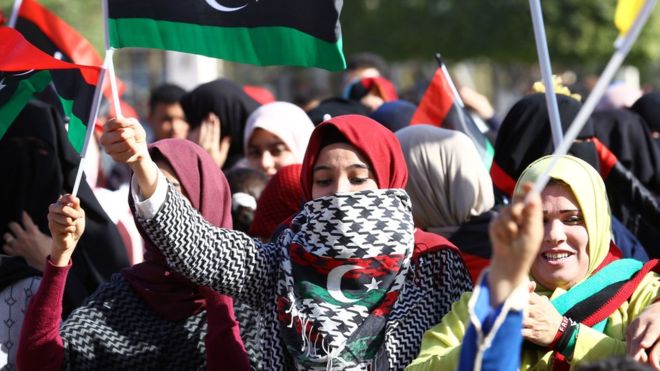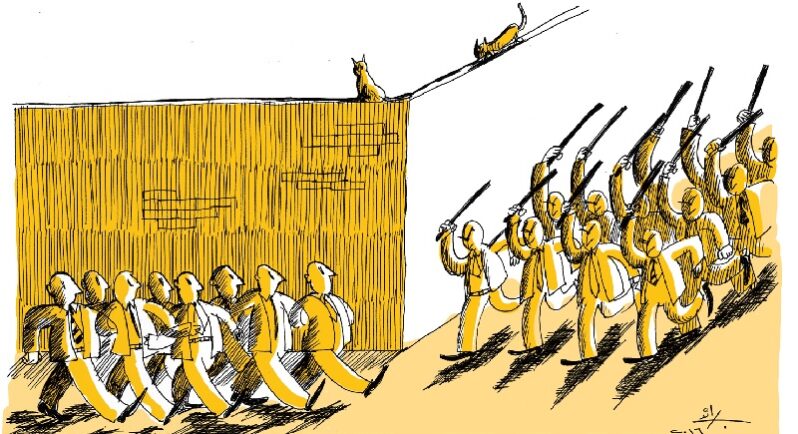Restricting Travel by Libyan Women: Interpretations and Repercussions

The system of Libyan legislations pertaining to women has undergone various developments and transformations, but since late last century they have followed the same pattern. Via an objective evaluation, we will clearly see legislations supporting women obtained under the previous regime. Whatever the political motives behind these legislations may be, they prevailed over numerous social constraints that bound women’s freedoms, deprived them of rights, and prevented them from practicing rights granted to them. After the revolution, it became apparent that because of several factors, a regression in these rights had occurred. I addressed this regression from a legislative angle in a previous article.[1] Now I shall follow up on the developments in this scene.
Firstly: The Drama
With no precursor and in a move that surprised and baffled everyone, Military Governor for Derna-Ben Colonel Abdel Razik al-Naduri issued Decision No. 6 of 2017 on February 16, 2017. This decision instructed the executive authorities controlling the land crossings and airports under his authority to bar women younger than 60 years old from traveling [abroad] without a mahram, i.e., a male relative. The preamble of the decision cited security reasons.
As soon as the decision was issued, it spread like wildfire within civil and rights circles inside and outside Libya. Discussion about the decision dominated the printed, audiovisual and social media, both Arab and foreign. Because of this intense pressure from civil groups, the military governor suspended his decision. On the 23rd of the same month, he issued Decision no. 7 of 2017, abrogating Decision No. 6 and banning all citizens from ages 18 to 45 from traveling without security clearance from the intelligence services.
The [second] decision’s preamble and second article explained that it was taken for “reasons of public interest…to establish controls needed to confront the foreign danger threatening the country’s national security, and to curb several negatives that have accompanied this age cohort of our sons and daughters and protect them from falling into the trap of joining terrorist organizations”. The text explained that it is “a regulatory measure that does not infringe the essence of the rights and freedoms stipulated by the legislations in force”. The authority that grants the security clearance is determined by personal jurisdiction. Military intelligence grants clearances to military personnel, whereas the General Intelligence Agency grants them to civil society institutions and intelligence personnel. The General Security Apparatus grants clearances to public sector institutions, bodies, and companies provided that a certificate is obtained from the employer.
The decision’s third article stated that clearance shall be granted once the required documents have been submitted, and the security forces have been consulted.
Finally, the decision explicitly limited the timeframe of its application, explaining that it is a temporary decision adopted during a state of emergency. The decision’s fourth and fifth articles stipulated that it is effective from the date of issuance –February 23, 2017– and expires as soon as the state of general mobilization becomes unnecessary and is declared over.
Naturally, the decision’s territorial scope is limited to the Libyan territory over which its issuer has authority, namely the area extending from the city of Derna in the east to the city of Ben Jawad in the west.
Secondly: The Repercussions
Jurists and defenders of freedoms set about disputing one of the first decisions pertaining to women on legal grounds, citing the international before the local ones and the constitutional before the ordinary ones. This campaign manifested in statements issued by civil society collectively[2] and individually, and in announcements of court cases to annul the decision. The decision is a blatant violation of Article 12 of the International Covenant on Civil and Political Rights (ICCPR) of 1966. This article –as well as Article 12 of the African Charter on Human and Peoples' Rights– stipulates that individuals have the right to move about within their country’s territory, and to leave their country. Subsequently, any individual, irrespective of gender or nationality, has this right provided that they are in that country lawfully. Reference was also made to the Convention on the Elimination of All Forms of Discrimination against Women (CEDAW).
The military governor’s decision is also considered a violation of the Libyan Interim Constitutional Declaration that was issued by the National Transitional Council and is still in effect. Article 14 of this declaration stipulated that the state shall guarantee a range of freedoms, including freedom of movement provided that the exercise of this freedom complies with the law. Article 31 of the Libyan Political Agreement also stipulated that “all Libyans, males and females, shall have the right to free movement throughout Libya and the right to travel abroad…No action shall be taken with the intention to restrict anyone’s freedom of movement”.
While paragraph 3 of Article 12 of the ICCPR and paragraph 2 [of Article 12] of the African Charter on Human and Peoples' Rights gave the state parties, including Libya, the right to restrict the freedom of movement or the right to leave the country in order to protect national security, public order, public health or morals, or the rights and freedoms of others, it required that such restriction be issued as law by the relevant authority. The ICCPR Human Rights Committee added that the restriction on movement and leaving the country must be necessary to protect one of the interests stipulated, such as national security, and that it must be the least interventionist means available to the state to protect this interest. Furthermore, banning Libyan women from travel is a legal action that contravenes the Libyan Constitution, given that these decisions are completely beyond al-Nadori’s powers as a military governor as according to the emergency and general mobilization laws.
Thirdly: Backstage
Whatever the legal bases cited by opponents of the decisions and the legal grounds declared by the decision-makers may be, there are ulterior motives and indirect justifications that show the rationale behind them. These justifications range from religious to security-related to sociocultural.
The Religious Justification
The Fatwa Office issued more than 35 fatwas from 2013 to 2015, all of which restrict women’s rights. Some of them bar women from traveling without a male accomplice. Although these fatwas are in practice non-binding, they are influential in Libyan society. For as soon as the decision restricting the freedom of women to travel without men was issued, proponents of orthodox Islam –i.e., the adherents of the Salafist school or the so-called “pious predecessors”– affirmed in media outlets the need to follow its dos and don’ts. Without going into the ramifications of this school, here we shall merely refute the religious justification with the fatwa issued by al-Azhar al-Sharif.
A woman may travel without a mahram provided that she is satisfied that her religion, self, and honor will be safe during her travel, stay, and return and that she will not be subjected to harassment jeopardizing her person or religion…[There are a number of] hadiths prohibiting the travel of a woman alone without a mahram; they relate to the insecurity associated with such travel in previous eras. Most scholars have permitted a woman to travel for obligatory hajj without a mahram, if accompanied by trustworthy women or company.[3]
It is clear to us that for the Islamic jurists, the presence of security is the key for undertaking or refraining from travel. The opinion appropriate for fatwa is that it is fine for a woman to travel alone via safe means, and populated routes and crossing points, from ports to airports to public transport. This applies whether she is traveling for something obligatory, recommended or permissible. The hadiths forbidding a woman from traveling without a mahram pertain to insecurity. Hence, if there is security, the prohibition on travel does not encompass her in the first place.[4]*
Security as a Justification
To quell the talk about the control of the “pious predecessors” over the military establishment in the country’s east and the people’s fear of them being a new Ansar al-Sharia, the military establishment made up its mind and the military governor declared that the restriction was based not on religion at all, but on security. This he detailed in his second decision (no. 7), which amended the first decision (no. 6).
For behind the decision lies a security concern of persons, not of a state, especially toward the unmonitored and unaccountable movement of female civil society activists. This is confirmed by the first decision’s preamble, which cited “public interest” and “the negatives that have accompanied the travel of women alone”, and by statements that al-Nadori made via phone interviews with multiple media channels, such as Libya Alhadath and Libya’s Channel, on the evening of February 19, 2017. He said that they “discovered that several foreign intelligence [agencies] have infiltrated [the cohort of] young Libyan girls not conscious of national security, via the pretext of joining civil society institutions and traveling to several countries”. He also stated that there are “security reports indicating that the movement of women has increased in very large numbers on the pretext of women’s conferences, whereas these women are relating false reports about the armed forces and being used against Libya.”
Social media pages and Viber group chats inform us that the background of this “golden” advice is political and ideological disagreements between female civil society activists in the joint meetings that are hosted outside Libya –particularly in Tunisia– under the auspices of the UN Support Mission, Women’s Support and Empowerment Unit. These meetings aim to bring the parties’ views closer together, and to promote women’s role in peace and conflict resolution. The disagreement has reached the point of attempts by “upstanding” citizens to warn the military establishment about those women who disagree with them politically, even though the military establishment knows for certain that the Libyan state has lax borders and incomplete territorial sovereignty; this makes it extremely easy for any legal entity –organizations or states– to spy without needing to recruit women or men from within Libya.
After al-Nadori issued the first decision –the one banning women under 60 years of age from travelling without a mahram– all female rights activists rose against it. They saw the decision as a collective punishment. Hence, a group of female civil society activists in Benghazi hastily organized a protest against the decision, and issued a statement condemning it. Some of them even met the military governor, presenting their objections and arguing that it brands all female civil activists as traitors.[5]
In fact, the decision was abrogated by a second decision containing a different restriction, albeit one bestowed with a legal and rights-concordant character. Its temporal, territorial, qualitative, and personal scope was defined, and it was generalized such that it applied equally to all citizens in a specific age cohort that the decisionmaker saw as the target for recruitment against Libya.
The Socio-Cultural Justification
Intellectual and media figure Mahmoud Shammam sees the first Salafist trial balloon in Libya as unsuccessful. According to him, a Libyan woman is a woman of full capacity and not a hurma [an inviolable thing that must be protected], and the Libyan household is what nurtures and directs [not the military governor]. In reference to the flimsy security justifications, Shammam states that those who betrayed [iconic Libyan independence leader] Omar Mukhtar, and those who betrayed and broke away from Gaddafi were men. As for accusing the United Nations of recruiting Libya’s women to spy, that is another sociocultural matter.[6]
However, the women’s position in the Libyan value system does not inspire optimism. The general trend of the Libyan collective mind after the issuance of the first decision corroborates what surveys have shown, regarding the low value of women’s rights and freedoms in the Libyan value system.[7] The first decision split men into three categories to varying degrees and percentages: Salafists and their bedfellows, i.e., religious advocates who lauded and applauded the decision; the few civilians accused of secularism, who support it in its rejection [of the decision]; and, the silent majority who evidently think that there are more important matters, for the state is squandering and the right to a decent life with a minimum level of shelter, food, and clothing is the most they hope for.
This article is an edited translation from Arabic.
*Translator’s note: An official loose translation of the fatwa –which was used as the basis of the translation provided here– can be found on Dar al-Ifta al-Missriyyah’s website.
__________
[1] See: Jazya Gebril’s, “Women’s Rights in Libya: Preserving Past Gains, Fearing for the Future”, The Legal Agenda – Tunisia, Issue No. 3, December 2015.
[2] Statement issued by us –civil society activists and organizations– in Benghazi on February 20, 2014.
[3] The fatwa goes on to state: “They based their opinion on the precedence of the Mothers of Believers (may Allah be pleased with them) who went on hajj after the death of the Prophet (peace be upon him) and during the caliphate of 'Umar (may Allah be pleased with him) accompanied by 'Uthman ibn 'Affan (may Allah be pleased with him).”
[4] Imam Abu al-Hasan ibn Batal in Sharh Bukhari (vol. 4, p. 532, Rushd Bookstore).
[5] As president of the Commission of Civil Society, Dr. Abir Imneina headed the women's delegation. The delegation included female lawyers and rights activists from Benghazi, as Imneina stated on her Facebook page.
[6] Mahmud Shammam’s post on the suspension of the decision on his Facebook page.
[7] Eight out of ten oppose women’s right to travel alone outside of the country. al-Mash al-Shamil li-Ara’ al-Libiyyin hawl al-Hiwar al-Watani, University of Benghazi Research and Consulting Center, 2015.



